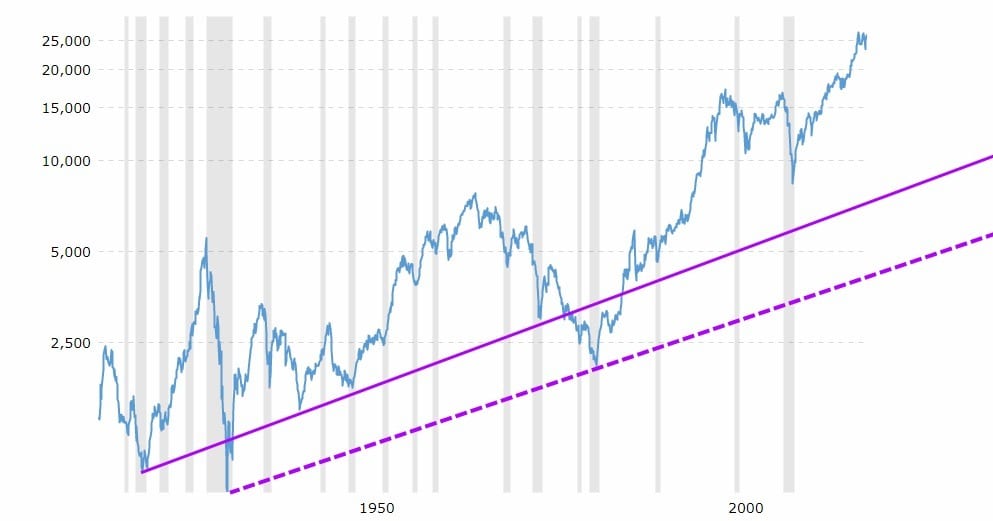
Editor: Johnathan Meyers | Tactical Investor
Finance Market Basics: The Art of Riding the Trend
Oct 1, 2023
It’s essential to approach market predictions and investment strategies with caution. While it is true that the Federal Reserve’s policies can have an impact on the markets, making definitive statements about the future direction of the market can be challenging and speculative.
The stock market is influenced by a multitude of factors, including economic indicators, geopolitical events, company performance, and investor sentiment. It is a complex system that can be difficult to predict with certainty.
It is important to conduct thorough research and analysis before making any investment decisions regarding specific sectors or investments. While certain sectors like robotics and artificial intelligence may have growth potential, evaluating the fundamentals, growth prospects, and risks associated with individual assets is crucial.
Additionally, it’s worth noting that no investment strategy is foolproof, and diversification across different asset classes and sectors can help mitigate risk. It is always prudent to consult with a financial advisor or conduct independent research before making investment decisions.
Finance Markets Simple Game Plan
While it is true that historically, the stock market has generally trended upwards over the long term, it is important to approach investing with a well-rounded strategy that takes into account various factors. Here are a few points to consider:
1. Diversification: It is important to diversify your investment portfolio across different asset classes and sectors. This can help mitigate the risks associated with any single investment and provide a more balanced approach to your overall strategy.
2. Risk Management: While trends can provide valuable insights, it is crucial to manage risk appropriately. This includes setting realistic expectations, establishing a suitable asset allocation, and implementing risk management techniques such as stop-loss orders or position sizing.
3. Fundamental Analysis: Consider analyzing the fundamental factors influencing the markets, such as economic indicators, company financials, and geopolitical events. This can help you make informed investment decisions based on the underlying value and prospects of the assets you are considering.
4. Long-Term Perspective: While short-term market fluctuations can be volatile, it is essential to maintain a long-term perspective when investing. Historical data shows that the stock market has generally trended upward over extended periods. However, this does not mean there won’t be periods of volatility or market corrections along the way.
5. Flexibility and Adaptability: Financial markets are dynamic and subject to change. It is essential to remain flexible and adapt your investment strategy as market conditions evolve. This may involve adjusting your portfolio allocation, considering new opportunities, or reassessing your risk tolerance.
Successful investing requires careful analysis, risk management, and a long-term perspective. It is essential to approach the financial markets with a well-thought-out strategy that considers both potential opportunities and risks.

Tactical Investor Update on Finance on Finance Market Basics
In terms of the stock market, until the Fed changes its mind, all sharp corrections have to be viewed as buying opportunities, and backbreaking corrections have to be placed in the category of “once in a lifetime events”, provided of course the trend is positive. That is what we are here for; to inform you if the trend is positive (Up) or negative (down).The world is going to witness a Fed that has decided to make a cocktail of Coke, Heroin, Crack and Meth and take it all in one shot. Imagine what a junkie on this combination of potent drugs is capable of doing, and you will have an idea of where the Fed is heading in the years to come. Now the Gold bugs will cry “I told you so”. Our response to this statement; not so fast little bugs. While precious metals will do well, we think stocks in key sectors (and we are not referring to Gold stocks) will pulverise the precious metals sector in terms of returns. One such area is robots (particularly Sex-bots) and AI. Market Update Feb 28, 2019
Treat Stock Market Corrections as Opportunities
Take time to understand the main principles of Mass Psychology; without that, you will give in to fear every time the market pulls back strongly. Understand that our first reaction is to flee when confronted with any danger; don’t fight that feeling. Study it and understand it for what it is. When you learn it, you will see how bad such emotions are, and in doing so, you will have moved to the stage where you will have the power to say yes or no when exposed to a similar situation. Read history books; you do not have to learn from your experiences only; you can learn by studying other people’s reactions.
Once you have mastered that, find 2-3 technical indicators that appeal to you. They must appeal to you; don’t just choose them because they sound fancy or are promoted as the best. Once you find some appealing technical indicators, study them and look for patterns. Technical analysis is like art; beauty is in the eye of the beholder. Use long-term charts, preferably weekly and monthly charts.
Understanding mass psychology and emotional reactions in the stock market can be valuable when approaching market corrections. Fear and panic can indeed lead to irrational decision-making, and studying historical market reactions can provide insights into human behaviour during market downturns.
In addition to studying mass psychology, incorporating technical analysis can be a valuable tool in analyzing market trends and identifying potential buying opportunities. Technical indicators can help traders and investors understand patterns, support levels, and resistance levels in the market. However, choosing indicators that resonate with you and align with your investment strategy is important, rather than solely relying on popular or promoted indicators.
Long-term charts, such as weekly or monthly charts, can provide a broader perspective on market trends and help filter out short-term noise. They can help identify long-term trends and provide a more accurate picture of the overall market direction.
It’s important to note that no investment strategy or indicator guarantees success, as the stock market is complex and influenced by various factors. It’s always prudent to conduct thorough research, diversify your portfolio, and consider your risk tolerance before making any investment decisions.
Remember that investing in the stock market involves risks, and past performance is not indicative of future results. Consulting with a financial advisor and staying informed about market conditions can help make more informed investment decisions.
Refining Stock Market Analysis: Key Indicators for Precision
Here are a few examples of commonly used technical indicators in stock market analysis:
1. Moving Averages (MA): Moving averages are used to identify trends and smooth out price fluctuations. The most commonly used moving averages are the simple moving average (SMA) and the exponential moving average (EMA). Traders often look for crossovers between moving averages as potential buy or sell signals.
2. Relative Strength Index (RSI): The RSI is a momentum oscillator that measures the speed and change of price movements. It ranges from 0 to 100 and is used to identify overbought and oversold conditions in a stock. A reading above 70 indicates overbought conditions, while a reading below 30 indicates oversold conditions.
3. Moving Average Convergence Divergence (MACD): The MACD is a trend-following momentum indicator that shows the relationship between two moving averages of a stock’s price. It consists of a MACD line and a signal line. Crossovers between these lines are used to generate buy or sell signals.
4. Bollinger Bands: Bollinger Bands consist of a moving average (typically the SMA) and an upper and lower band that are based on the standard deviation of the stock’s price. Bollinger Bands help identify volatility and potential price reversals. When the price moves close to the upper band, it may signal overbought conditions, while prices near the lower band may indicate oversold conditions.
5. Fibonacci Retracement: Fibonacci retracement levels are horizontal lines drawn on a price chart that indicate potential support and resistance levels based on Fibonacci ratios. Traders use these levels to identify potential entry or exit points during price retracements within a more significant trend.
6. Volume: Volume is not a traditional technical indicator, but it is often used in conjunction with price analysis. High volume during price movements can indicate a trend’s strength or confirm a price breakout.
These are just a few examples of technical indicators used in stock market analysis. It’s important to note that no single indicator should be relied upon alone, and it’s often beneficial to use a combination of indicators and other analysis techniques to make more informed trading decisions.
Provocative Readings for the Curious
Inflation the Silent Killer Tax that’s Destroying Middle-Class America
Revamping the 60 40 Rule: Unleashing New Strategies for Success










